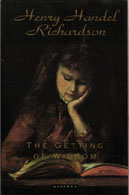 | The Getting of Wisdom Henry Handel Richardson 1910 |
It's been a few weeks since I posted my previous entry in this category. I haven't forgotten it, just been swamped by travel, family, work and real life. You know, all that stuff that gets in the way of reading.
Henry Handel Richardson was the pseudonym of Ethel Florence Lindesay Richardson, a writer who was born in 1870 to a reasonably well-off family which later fell on hard times. The author's family lived in various Victorian towns and from the age of 13 to 17 Richardson attended boarding school in Melbourne. It's this experience that feeds directly into The Getting of Wisdom.
Laura, the main character, is the eldest child of a country family. The father is dead before the book starts and the mother lives, presumably, off some investment income and earnings from dress-making. This is rather vague in the book but is really of little importance. The novel concentrates solely on Laura and information is passed to the reader via her experiences and her understanding of the world. The girls at the school she attends are generally from rather wealthy families and those, like Laura, who come from less fortunate backgrounds learn very early not to divulge their circumstances for fear of ridicule. From time to time Laura lets little snippets of information about her family slip out, and she suffers for it.
In fact, these seem to be the main forces controlling the action of this book: fear of one's peers, embarrassment about one's family, and the desire to "better" onself by belittling others. None of the girls in the school, nor the teachers for that matter, come across as anything but self-serving and boorish. Even Laura, who starts out so young and strong, surrenders to the role expected of her. It's not a very pretty picture of teenage schoolgirls at the end of the nineteenth century. Laura undergoes a form of redemption at the end of the book, convincing herself that cheating in an exam is actually God's will, and then later deciding that while she was wrong to do so, she got away with it and therefore God had no actual hand in the matter or else he would have punished her for the sin. A neat case of self-delusion. At the end, when Laura is walking away from the school for the last time, she is overcome with a desire to run, and the last we see of her is a rapidly diminishing form disappearing through a park. She is free at last: free of the overwhelming constrictions of the school, the teachers' expectations and the other schoolgirls' callous disregard.
As a reader you hope that times have changed, and that schools and school children aren't like this anymore. But at the back of your mind, as you remember your own school-years, you know full well that they haven't.
Notes:
Full text of the novel
Photo of the author
Australian Dictionary of Biography page
Wikipedia author page
Film version of the novel from 1977.
The next four works in this Classic Year:
12. "The Gentle Water-Bird" by John Shaw Neilson (1927)
13. My Brilliant Career by Miles Franklin (1901)
14. The Magic Pudding by Norman Lindsay (1918)
15. Coonardoo by Katherine Susannah Prichard (1929)
